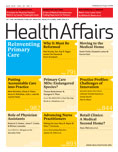 This month some of the best thinkers in geriatrics (most of whom Hartford is privileged to support as grantees) have an important paper in Health Affairs on the preparation of the physician workforce for care of older adults with chronic conditions.
This month some of the best thinkers in geriatrics (most of whom Hartford is privileged to support as grantees) have an important paper in Health Affairs on the preparation of the physician workforce for care of older adults with chronic conditions.
They start by drawing out the service need implications of the demographic shifts we face (20% of the population >65 by 2030) and noting the poor quality and high costs of providing care to older adults with our current methods. Reasoning from the skills needed to implement effective models of care, such as IMPACT, Guided Care, and GRACE, they deduce the skills that physicians need in order to successfully participate in these care models. (Already this line of reasoning is a significant departure of the more conventional world view that casts the physician as the alpha and the omega of patient service, regardless of what specific skills he or she may have.)
Finally, from this portrait of the workforce and its needed competencies, the authors get down to business in discussing the human capital infrastructure (i.e. teachers) needed to inculcate these competencies in physicians. They address an ongoing discussion within the geriatrics field: should geriatrics be a clinical specialty, or an academic/educational specialty that provides leadership in teaching, researching, and designing services for high quality care of older adults? If the latter, it improves care through its impact on other physicians and health professionals, rather than through its own direct care.
 Ideally one could have both. But ultimately, I read the authors’ conclusion as saying that geriatrics is stuck on the horns of a dilemma. The number of geriatricians is not growing to the point needed to be a viable practice field, and the current one-year fellowship does not prepare its trainees with the educational skills they need to become leaders in influencing other practice fields to incorporate elements of geriatrics. Moreover, the things we have been doing to solve the dilemma (e.g., shortening the fellowship, recruiting harder) haven't worked. We have to try something else.
Ideally one could have both. But ultimately, I read the authors’ conclusion as saying that geriatrics is stuck on the horns of a dilemma. The number of geriatricians is not growing to the point needed to be a viable practice field, and the current one-year fellowship does not prepare its trainees with the educational skills they need to become leaders in influencing other practice fields to incorporate elements of geriatrics. Moreover, the things we have been doing to solve the dilemma (e.g., shortening the fellowship, recruiting harder) haven't worked. We have to try something else.
This is bad enough. However, there are a couple of points that the authors don't mention that make me even more concerned.
- The quality of chronic care is poor and it is not really getting better. If we take the results of “the most terrifying study ever” seriously we can see that the physician training enterprise is failing when it comes to primary care training in general and failing miserably when it comes to preparing for care of seniors.
- Seventy-two percent of fellows in geriatrics are foreign medical graduates. Many of these may come from less ageist societies than ours and could be just who we need to lead change. However, we should acknowledge that some percentage have visa issues, use geriatrics as a non-competitive back-up fellowship, and may very well need to work in an underserved area post- fellowship to get permanent status. This is not a bad thing for the older adults in the lucky community, but it is damn near fatal for an academic/leadership career.
- The authors are politic as physicians to limit their comments to physician education, but the situation they describe is replicated in each of the professions in which Hartford funds, and I suspect in most others as well. Too few trainees are interested in specializing in direct clinical care to meet the actual service needs, and those who do specialize don't have the extra skills or adequate support of their fields to leverage themselves for a broad impact on the entire workforce.
Despite the gigantic proportion of health care services delivered to older adults (55% of hospital bed-days) and the problems in their care with the current workforce and care delivery models, it seems that health care is just not willing to face up to the nature of its primary customers. Consumer demand and professionals' sense of responsibility must work together to ensure that non-geriatricians put more effort into teaching and practicing high quality care of older adults.
Resources
For more information on each of the authors:
- Chad Boult, professor, Johns Hopkins Bloomberg School of Public Health. One of the primary developers of Guided Care.
- Steven Counsell, professor of geriatrics, Indiana University School of Medicine.
- Rosanne Leipzig, professor of geriatrics and palliative medicine, Mount Sinai School of Medicine.
- Robert Berenson, institute fellow, Health Policy Center, Urban Institute.
For the “Don’t Kill Granny” list of geriatric competencies we developed in partnership with the Association of American Medical Colleges:
http://www.aamc.org/newsroom/presskits/competencies.pdf
